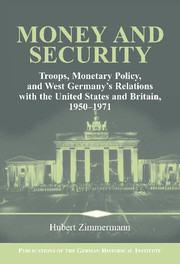 Money and Security
Money and Security Book contents
- Frontmatter
- Introduction
- 1 On Whose Shoulders? German Rearmament and the Cold War Burden
- 2 The British “New Look” and Anglo-German Relations
- 3 Adenauer and “Perfidious Albion”: Troop Reductions, Support Costs, and the Integration of Europe, 1957-1959
- 4 The Radford Plan: America and Its Troops in Germany, 1955-1958
- 5 The Political Economy of U.S. Troop Stationing in Europe
- 6 Offset and Monetary Policy During the Kennedy Administration, 1961-1962
- 7 The Bargain Slowly Unravels: Offset, Troop Reductions, and the Balance of Payments, 1962-1965
- 8 The Culmination of the Burden-Sharing Conflict: Chancellor Erhard’s Visit to Washington in September 1966
- 9 The Trilateral Negotiations of 1966-1967
- Conclusion
- Appendices
- Bibliography
- Index
1 - On Whose Shoulders? German Rearmament and the Cold War Burden
Published online by Cambridge University Press: 05 January 2013
- Frontmatter
- Introduction
- 1 On Whose Shoulders? German Rearmament and the Cold War Burden
- 2 The British “New Look” and Anglo-German Relations
- 3 Adenauer and “Perfidious Albion”: Troop Reductions, Support Costs, and the Integration of Europe, 1957-1959
- 4 The Radford Plan: America and Its Troops in Germany, 1955-1958
- 5 The Political Economy of U.S. Troop Stationing in Europe
- 6 Offset and Monetary Policy During the Kennedy Administration, 1961-1962
- 7 The Bargain Slowly Unravels: Offset, Troop Reductions, and the Balance of Payments, 1962-1965
- 8 The Culmination of the Burden-Sharing Conflict: Chancellor Erhard’s Visit to Washington in September 1966
- 9 The Trilateral Negotiations of 1966-1967
- Conclusion
- Appendices
- Bibliography
- Index
Summary
german rearmament and allied troop maintenance in germany
When in May 1955 the Paris Accords came into effect, the long and tortuous process of forming an integrated Western security system was finally concluded after more than five years of negotiations. The major stumbling block had been the politically sensitive question of whether and how the former enemy, Germany, was to be integrated into this structure. The result of the multinational effort was spectacular. It encompassed not only the rules for rearming West Germany but also the establishment of Bonn's sovereignty and its inclusion in NATO only ten years after the end of World War II. A reaffirmation of the continuity of large-scale NATO troop presence on German soil was a further core element of the settlement. American, British, French, Canadian, Dutch, Belgian, and Danish troops changed their status from occupiers to protectors.
The diplomatic events leading up to the Paris Accords, their political and military causes, and their implications have been the subject of much historical research. Much less is known about the economic foundations of these events, which are crucial to understanding the results: The formation of the Atlantic security system was inevitably shaped by fundamental economic factors in postwar transatlantic relations (and vice versa). Paying special attention to these economic factors, I briefly review the origins of the two elements that, in addition to the American nuclear guarantee, were pivotal for the Atlantic security system as it emerged in 1954–5:Western troop maintenance in Germany and West German rearmament. The link between these two elements is particularly emphasized.
- Type
- Chapter
- Information
- Money and SecurityTroops, Monetary Policy, and West Germany's Relations with the United States and Britain, 1950–1971, pp. 11 - 44Publisher: Cambridge University PressPrint publication year: 2002


